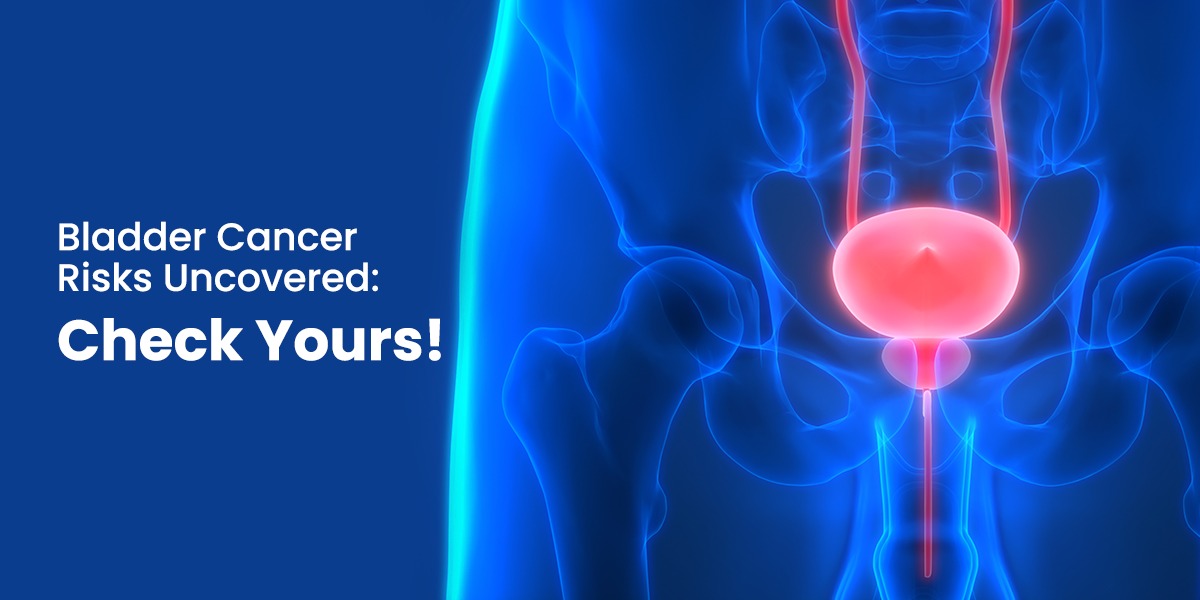Is Your Lifestyle Increasing Your Bladder Cancer Risk? Find Out Now!

Bladder Cancer is one of the most prevalent types of cancer across the globe. It is caused when the cells in the bladder begin to grow uncontrollably, which can lead to the spread and formation of a tumour. Though the reason behind bladder cancer remains unclear, it is associated with lifestyle factors. Hence, this blog throws light on the lifestyle, causes of potential risks and tips to reduce the risk.
What is Bladder Cancer?
To understand bladder cancer, let us first learn what a bladder is. The bladder is a hollow organ located in the lower abdomen, responsible for storing urine. Bladder cancer occurs when the cells in this organ grow uncontrollably, leading to the formation of a tumour.
Bladder cancer is classified into three categories:
- Urothelial carcinoma occurs in the cells inside the bladder. This is the most common type of bladder cancer.
- Squamous cell carcinoma occurs in the cells that line the bladder. This is a rare type of bladder cancer.
- Adenocarcinoma is associated with cells that form mucus-secreting glands in the bladder.
- Small cell carcinoma is associated with other forms of cancers like bowel or lung cancer but this is unusual.
Different stages of bladder cancer
There are five stages of bladder cancer and classification is based on how far it has spread within the bladder or other parts of the body.
- Stage 0: This is the initial stage where the cancer is confined to the inner lining of the bladder. Early detection at this stage is highly treatable.
- Stage 1: It is the next stage when the cancer cell starts to grow deeper. The disease is still treatable with the help of bladder cancer treatment like surgery.
- Stage 2: This is a more serious stage where the cells have invaded the bladder muscles. The bladder cancer treatment in this stage involves surgery, chemotherapy, radiation therapy or immunotherapy.
- Stage 3: This is an advanced one in the five stages of bladder cancer, where the cancer penetrates the bladder wall and starts spreading to the nearby organs. The bladder cancer treatment options at this stage will be surgery, chemotherapy and radiation therapy or immunotherapy.
- Stage 4: This is the last and most advanced stage of bladder cancer where the cancer cells spread to the nearby organs. This stage does not include curative treatment, it typically involves only chemotherapy, immunotherapy, and clinical trials.
If you are looking for the best oncologist in Lucknow & Kanpur, visit Regency Healthcare today.
Suggested Read: Common Early Signs and Symptoms of Ovarian Cancer
Role of Lifestyle Increasing the Risk of Bladder Cancer
The risk of bladder cancer depends on various factors. However, recent studies show that lifestyle choices can play a significant role in the likelihood of developing bladder cancer. Let’s find out more.
Smoking
Smoking has been considered one of the most prominent reasons for bladder cancer.
Smoking introduces harmful chemicals into the bladder that start irritating the cells.
Physical Activities
Lack of physical activity has been the reason for several ailments. Being physically inactive can lead to lower immunity and poor circulation leading to excessive weight gain.
Diet and Nutrition
Indulging excessively in highly processed food, red meat and sugary drinks contributes to the overall inflammation in the body. Apart from this, poor hydration can also be a culprit for bladder cancer.
Excessive Exposure to Chemicals
People in certain occupations are also at risk of developing bladder cancer, because of their exposure to certain harmful chemicals. These chemicals remain in the body for many years and cause bladder cancer.
Tips to Reduce the Risk of Bladder Cancer
There are several proactive steps that one can take to protect their bladder health:
- Avoid Smoking: Quitting smoking can be one of the stepping stones towards your journey to a healthy life. It might be difficult initially, so seek help from the medical professionals.
- Have a Nutritious Diet: Avoid or limit the intake of junk food items, red meat, and sugary drinks. Instead, switch to a wholesome and nutritious diet.
- Drink Plenty of Water: Drinking plenty of water helps to flush out toxins from the bladder. This not only reduces the chances of cellular damage but also helps to keep bladder infections at bay.
- Stay Physically Active: Staying physically active helps to protect us from numerous ailments including bladder cancer.
Conclusion
Bladder cancer is serious but preventable. While genetics and age play a role, your habits matter too. Smoking, poor nutrition, inactivity, and chemical exposure increase the risk. Protect yourself by quitting smoking, staying hydrated, eating nutritious meals, and staying active. Take charge of your health — start today for a healthier bladder tomorrow.

 Call-an-Ambulance
Call-an-Ambulance



